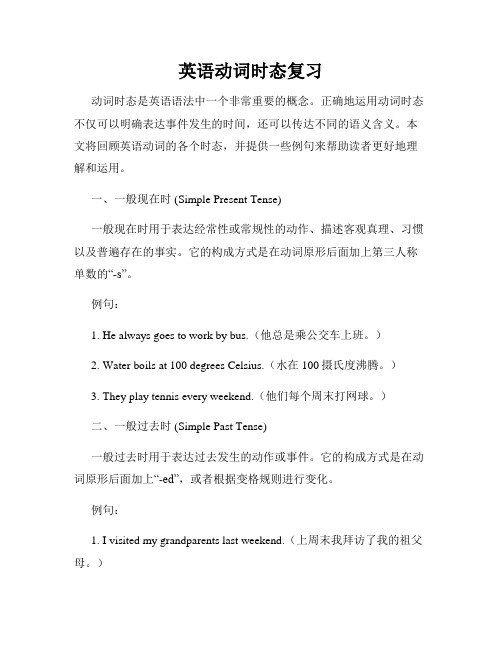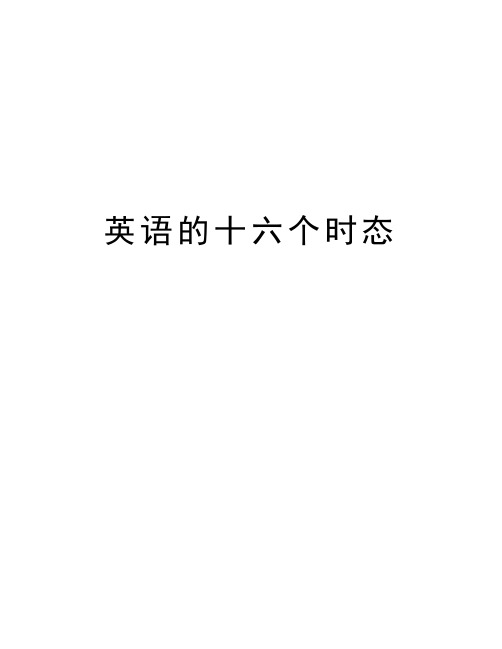时态复习
最新高考时态复习讲解

时态与语态考点一一般现在时1.一般用法(1)表示现在经常性、习惯性的动作或存在的状态。
(often, usually, always, every day, on weekends…)My mother works in a bank. She is a senior student.(2)表示客观真理、客观存在、科学事实等。
(不受时态限制)sThe earth moves around the sun. The geography teacher told us the earth moves around the sun.考例: Months ago we sailed ten thousand miles across this open sea, which ___ the Pacific, and we met no storms. (05辽宁卷)A.was called B.is called C.had been called D.has been called(3)在时间、条件、方式、让步状语从句中,代替一般将来时。
I will tell him the news as soon as I see him.考例:The number of deaths from heart disease will be reduced greatly if people ____ to eat more fruit and vegetables. Persuade B. will persuade C. be persuade D. are persuaded翻译If you will accept my invitation and come to our party, my family will be pleased.如果你愿意接受并参加我们的舞会,我的家人会非常高兴。
(4)表示按时间表、规定、计划或安排将要发生的动作。
初中英语六种时态复习课件(35张PPT)

②while 引导的从句表示“在……期间”,主从句谓语动词所表示的动 作同时ቤተ መጻሕፍቲ ባይዱ生。这时,主从句都用过去进行时。
e.g.:My father was reading the newspaper while my mother was watching TV.当我的妈妈看电视的时候,我的爸爸正在看报纸。
(2)表示普遍真理或客观事实。 e.g.:The sun rises in the east.太阳从东方升起。 (3)在条件状语从句和时间状语从句中,用一般现在时表示将来。 e.g.:If it doesn't rain tomorrow,we will go for a picnic.如果明天不下 雨,我们将去野餐。 (4)在某些以 here,there 开头的句子中用一般现在时表示正在发生的动作。 e.g.:There goes the bell.铃响了。
(3)现在进行时表示将来 表示位置移动的动词 go,come,leave,fly,start,meet,move 等, 可以用现在进行时表示将要发生的事。 e.g.:We are leaving for London.我们就要动身去伦敦了。
(4)一般现在时表示将来 ①表示按规定或时间表预计要发生的动作。 e.g.:Our plane takes off at 8:10.我们的飞机 8:10 起飞。 ②当主句为一般将来时,或含有情态动词,或是祈使句时,在 if,as soon as,until,when 等引导的状语从句中用一般现在时表示将来。 e.g.:I will give him the book as soon as he comes here.他一来这儿, 我就把这本书给他。
(2)表示当前一段时间内的活动或现阶段正在进行的动作。 e.g.:They are picking apples on a farm all the time.他们一直在农场 摘苹果。 (3)与 always,usually 等词连用,表达说话人强烈的感情,如赞扬、不 满、讨厌等。 e.g.:Mary is always thinking of others instead of herself.玛丽总是为 别人着想,而不为自己着想。
英语总复习专题:八种时态总复习

例如:He said that he would finish his work before 9 o’clock.
他说他会在九点之前完成工作。
2)“was/were going to+动词原形”所表示的过去将来
时,表示过去曾经打算做某事。
在疑问句中,主语为第一人称时(I和we)时,常 用助动词shall。 例如: Shall we go to the zoo tomorrow? 我们明天去动物园,好吗?
结构二: 主语+be going to +动词原形+其它 I am going to buy a car next year.
2. 一般将来时的用法 : 结构一的用法: 1)表示将来某个时间要发生的动作或存在的状态, 例如:I'll meet you at the school gate tomorrow morning. 2)表示将来经常或反复发生的动作。 例如:I’ll come and see you every Saturday next year. 3)表示说话人对于将来的看法、假设和推测。 例如:I think she’ll go back home for supper.
例如: He often goes swimming in summer.
他夏天经常游泳。
I usually leave home for school at 7 every morning.每天早上我七点离开家去学校。
2)表示现在的状态。 例如: The boy is twelve. 这男孩十二岁。 3)表示主语具备的性格、特征和能力等。 例如: My sister is always ready to help others . 我妹妹总是乐于助人。 Ann writes good English but does not speak well. 安英语写得不错,讲的可不行。
英语动词时态复习

英语动词时态复习动词时态是英语语法中一个非常重要的概念。
正确地运用动词时态不仅可以明确表达事件发生的时间,还可以传达不同的语义含义。
本文将回顾英语动词的各个时态,并提供一些例句来帮助读者更好地理解和运用。
一、一般现在时 (Simple Present Tense)一般现在时用于表达经常性或常规性的动作、描述客观真理、习惯以及普遍存在的事实。
它的构成方式是在动词原形后面加上第三人称单数的“-s”。
例句:1. He always goes to work by bus.(他总是乘公交车上班。
)2. Water boils at 100 degrees Celsius.(水在100摄氏度沸腾。
)3. They play tennis every weekend.(他们每个周末打网球。
)二、一般过去时 (Simple Past Tense)一般过去时用于表达过去发生的动作或事件。
它的构成方式是在动词原形后面加上“-ed”,或者根据变格规则进行变化。
例句:1. I visited my grandparents last weekend.(上周末我拜访了我的祖父母。
)2. She studied English in high school.(她在高中学习英语。
)3. They played basketball yesterday.(他们昨天打篮球。
)三、一般将来时 (Simple Future Tense)一般将来时用于表达将来发生的动作或事件。
它的构成方式是在助动词“will”后面加上动词原形。
例句:1. We will have a party tomorrow.(我们明天将举办一个派对。
)2. He will travel to Europe next month.(他下个月将去欧洲旅行。
)3. They will meet at the park later.(他们一会儿在公园见面。
)四、现在进行时 (Present Continuous Tense)现在进行时用于表达现在正在进行或暂时性发生的动作。
综合时态复习

18. If Mike _____ up earlier, he can finish the work in time. A. get B. will get C. gets D. is getting 19. The recorder_____ yesterday. It works OK now. A. repaired B. was repaired C. has repaired D. will be repaired 20. ---Do you know Jane? ---Yes, I first met her three years ago. She ______at a fruit shop at that time. A. had worked B. worked C. has worked D. was working
1. The shop ___ at 7:30 p.m. on weekends. A. will close B. closes C. closed D. has closed 2. If he ___ early tomorrow, he’ll be late. A. doesn’t get up B. won’t get up C. gets up D. doesn’t gets up 3. Listen! Xiao Li ___ an English song. A. is singing B. sings C. is going to sing D. sang 4. The harder you ___, the better results you will get. A. will study B. studied C. study D. studying 5. The teacher told us in class that the earth ___ around the sun. A. moves B. moved C. is moving D. to move 6. He used to ___ a lot. A.smoking B. smoke C. smoked D. smokes 7. Lucy ___ silly questions. A. is always asking B. always ask C. will always ask D. asks
英语的十六个时态复习课程

英语的十六个时态16种英语时态(经典收藏版),太全了!时态(Tense)是表示行为、动作和状态在各种时间条件下的动词形式。
因此,当我们说时态结构的时候,指的是相应时态下的动词形式。
英语时态分为16种,如下表所示:各时态结构及用法1. 一般现在时(do/does; is/am/are)①表示现在的情况、状态和特征。
例:He is a student.他是一个学生。
②表示经常性、习惯性动作。
例:He always helps others.他总是帮助别人。
③客观事实和普遍真理。
例:The earth moves the sun.地球绕着太阳转。
④表示一个按规定、计划或安排要发生的动作。
(常用于列车、客车、飞机或轮船时刻表)例:The next train leaves at 3 o'clock this afternoon.下一趟火车今天下午3点开车。
⑤主将从现:在时间、条件和让步状语从句中经常用一般现在表示将的来事情。
例:If it rains tomorrow, we will stay at home.如果明天下雨,我们会待在家里。
2. 现在进行时(am/is/are doing)①表示此时此刻正在发生的事情。
例:He is listning to the music now. 他现在正在听音乐。
②表示目前一段时间内一直在做的事情,但不一定此时此刻正在做。
例:I am studying by using Qisu English APP this term.这个学期我一直在使用奇速英语APP学习。
③现在进行时可以表示将来的含义。
瞬时动词的进行一定表将来。
例: I am leaving.我要离开了。
持续动词的进行只有有将来的时间状语或有将来语境中才表将来。
例: I am travelling next month.下个月我要去旅行。
④现在进行时与频度副词连用,表示说话者或褒义或贬义的感情色彩。
时态复习课件(共19张PPT)
六、现在完成时 (Present Perfect Tense)
是过去的动作或状态持续到现在并且已经完成,对现在造成的影 响,可能持续发生下去
1. I __h_a_v_e_s_tu_d_i_e_d_ (study) in the school since 2009. 2. Tom _h_a_s_li_v_ed__(live) in Beijing for two years.
Revision of Tenses
英语常见时态汇总:
1. 一般现在时 (Simple Present Tense) 2. 一般过去式 (Simple Past Tense) 3. 一般将来时 (Simple Future Tense) 4. 现在进行时 (Present Continuous Tense) 5. 过去进行时 (Past Contunuous Tense) 6. 现在完成时 (Present Perfect Tense)
结构: 主三动三,非三动原
三、一般过去时 (Simple Past Tense)
表示过去的动作或状态
1. I ___m_et_ (meet) him in the street yesterday. 2. His uncle _w_e_n_t _ (go) to Beijing last week. 3. We _w_e_r_e_ (be) at home just now.
_T_h__e_f_il_m__h__a_s_b__e_e_n__o_n__fo_r__1_0__m_i_n_u_t_e_s_.____
短暂性动词可以用于现在完成 时,但不可与表示一段时间的 时间状语连用,需要转换成延 续性动词或词组。
英语复习资料整理:8大时态
英语复习资料整理:8大时态八种基本时态1. 一般现在时概念: 表示经常发生的动作或经常存在的状态。
常和 always , often , usually , sometimes , every day 等表时间的状语连用。
如:1) I go to school every day . 我每天都去学校。
(表经常)2) He is always like that . 他总是那样。
(表状态)构成: 1) 主语+ be (am / are / is ) +……2) 主语 + 实义动词/三单动词+ …2.一般过去时: 1) 表示过去某个时间发生的动作或存在的状态.常和表示过去的时间状语连用. 如: yesterday , last week , in 1998 , two days ago等.如: I went to a movie yesterday. 我昨天去看了一场电影.2) 也可表示过去经常或反复发生的动作.如: He always went to work by bike last week.构成: 1) 主语+ be (was / were ) +……2) 主语 + 实义动词过去式 +3. 现在进行时概念: 表示现在(说话瞬间)正在进行或发生的动作.如: He is singing.They are watching TV now.构成: 主语 + 助动词be(am/are/is) + 动词-ing形式构成.4. 过去进行时概念: 表示过去某一时刻或某一段时间正在进行的动作. 这一特定的过去时间除了有上下文暗示外,一般用时间状语来表示.如: 1) ---What were you doing?---I was jumping.2) ---What was the boy doing when the UFO arrived?---He was sleeping.构成: 主语 + 助动词be(was/were) + 动词-ing形式构成.5. 一般将来时概念: 表示将来某个时间要发生的动作或存在的状态,也表示将来经常或反复发生的动作,常与表示将来的时间状语连用,如: tomorrow, next week, next year, in the future等.如: He will go shopping tomorrow.They are going to play basketball next week.构成: 1) 主语 + 助动词will + 动原+…2) 主语 + be going to + 动原+ ….6. 过去将来时概念: 表示在过去将来的某一时间发生的动作或存在的状态.构成: 1) 主语(第一人称) + 助动词should + 动原+…2) 主语 + would + 动原+ ….3) 主语 + was/ were going to +动原…用法: 过去将来时除了上下文暗示外,一般常用在间接引语中,主句谓语动词为过去时态.如: 1) I should go.2) You knew I would come.3) They were going to Naning.7. 现在完成时构成: 主语 + 助动词 ( have / has ) + 动词过去分词+…用法例句表示过去发生或已经完成的动作对现在造成的影响或结果. ---Have you had your lunch yet?---Yes, I have. (现在我不饿了)8. 过去完成时构成: 主语 + 助动词 had + 动词过去分词+…用法例句表示过去在过去某一时间或动作之前已经发生或完成了的动作.它表示的动作发生的时间是”过去的过去”.表示过去某一时间可用by, before 等构成的短语,也可用when, before, 等引导的从句或者通过上下文表示.I had finished my homework when my mom came back home.【(公众号:英语教学)】。
四大时态复习
英语中的四大“师太”(时态)一.一般现在时态表示事物或人物特征,也可表示经常性或习惯性动作。
(没有严格的时间限定) <例> I am a student, he is a teacher.I go home after school.He plays computer games in the evening.When does she go to school?★注意: 一般现在时中be 动词的变化:,,. 助动词do的第三人称单数形式:。
以及实意动词(行为动词)的三单形式:一般在末尾直接加“___”。
(其他规则见教材P8)二.一般过去时态表示过去某个时间发生的动作或状况。
常和表过去的时间状语连用,如:two years ago(两年前),last year(去年),last week( ),yesterday()……<例> She was 11 years old last year.I went to school yesterday.Tom played ping-pong last weekend.Where did you go last night?★注意:一般过去时中be动词的变化:_____, ______。
助动词do 的过去式:____。
以及实意动词的过去式:一般在末尾加“_____”。
(其他规则见教材P12,不规则变化须特殊记,见教材P13)三.现在进行时态表示正在发生的动作或行为。
结构:主语+be(am, is, are)+ 现在分词(动词ing)三个好伙伴:look(看),listen(听),now(现在)。
<例> I am read ing a book, my mother is cook ing.Look! The kite is fly ing.Listen! The girls are sing ing.What are you doing?★现在进行时态有两大要素:be动词和动词ing. 二者缺一不可。
动词的时态的复习
(4)come, go, move, leave, stay等动词的现在进行时可以表示 按计划将要发生的事。如:
I’m leaving tomorrow. 明天我要走了。 They are going camping for vacation. 他们度假要去野营。 Are you staying here till next week? 你会在这儿呆到下周吗?
要点梳理
动词的时态一直是中考考查的重点内容。对时态的考查 主要集中在一般现在时(表示客观规律和在时间、条件状语从 句中表示将来时的意义)、一般过去时、一般将来时、现在进 行时和现在完成时。
Ⅰ.一般现在时: 一般现在时用动词原形来表示。当主语为第三人称单数时, 动词要变为第三人称单数形式。 1.表示经常性或习惯性的动作、存在的状态或现阶段的习惯 行为。 常用的时间状语:every day, usually, always, often, sometimes, on Sunday, once a week等。 如:I go to school at 7 every morning. 每天早上我七点去上学。 2. 表示目前的情况,特点或状态。 如:I am a teacher. 我是教师。 She likes watching TV. 她喜欢看电视。
come/arrive/reach/ get/move to—be in/at come back—be back
buy—have borrow—keep go out—be out die—be dead leave—be away return—be back go to bed—be in bed become—be go to sleep—sleep
Ⅲ.现在进行时: 现在进行时表示现阶段或说话时正在进行的动作及行为,常 和now, at this time, these days等时间状语连用。句子基本结构为: be动词am/is/are+现在分词。 如:Look, they are running. 看,他们正在跑步。
- 1、下载文档前请自行甄别文档内容的完整性,平台不提供额外的编辑、内容补充、找答案等附加服务。
- 2、"仅部分预览"的文档,不可在线预览部分如存在完整性等问题,可反馈申请退款(可完整预览的文档不适用该条件!)。
- 3、如文档侵犯您的权益,请联系客服反馈,我们会尽快为您处理(人工客服工作时间:9:00-18:30)。
一般现在时:写出下列动词的相应形式:1. 第三人称单数:wash_________ match _______guess______ study______ finish_________ go________ snow______ carry_________2.写出下列动词的过去式:stop______ see________ drive ________let_______ carry______ keep_____ join______ find_______ think________ teach______ catch______3. 写出下列动词的现在分词形式:stay_______ begin______ forget_______ forget______ lie________ die _______ run_______ prefer______ give________ ring_______ dance______ hope_______II. 用所给动词的适当形式填空:1.I ________(write) to you as soon as I _______(get) to London.2. He doean’t feel well and ____________(not eat) any food this morning.3. He ______ not _______(see) me come in, for he ___________(read) something with great interest.4. I _________(l;et) you have the book as soon as I _________(finish) it.5. While we ________(wait) for our teacher, a little boy ________(run) up to us.6. Don’t make a niose. Grandpa __________(sleep).7.It’s seven now, Tom’s family__________(watch) TV.8. It ________(take) me two hours to finish my homework last night.9. What ______ your mother _______(do) at eight yesterday evening? She _______(wash) clothes.10. _______ it ______ (rain) when school was over yesterday?11. What _______(do) _______ tomorrow? We ________ (play) football.12. There ________ (be) a football match on TV this evening.13. They said they ________ (visit) the Great Wall the next summer holiday.14. Who _______ (dance) the best in your class?15. Will you come if he _____________ (not come)?一般过去时I.用所给的动词的适当形式填空。
⒈He _____(visit) the Great Wall last year.2.We________(have) a good time yesterday.3.We often _______(go) to school by bus last year.4.I ________(live)in the village when I was a child.5.Mike______(see) a big tiger in the nature park last year.6.Sam_____ (do) the housework yesterday.7.______(do) you _______(enjoy) yourself yesterday?8.______(do)you _________(play) the violin in the artroom yesterday? No, I didn't. I_____(draw)some pictures there.9.. I ______ (eat) a big pizza yesterday.10.There____ (be) many sheep on the farm last year.11. I ______ (watch) a cartoon on Saturday.12. Her father _______ (read) a newspaper last night.一般将来时( ) 1. There __________ a meeting tomorrow afternoon.A. will be going toB. will going to beC. is going to beD. will go to be( ) 2. Charlie ________ here next month.A. isn’t workingB. doesn’t workingC. isn’t going to workingD. won’t work( ) 3. He ________ very busy this week, he ________ free next week.A. will be; isB. is; isC. will be; will beD. is; will be( ) 4. There ________ a dolphin show in the zoo tomorrow evening.A. wasB. is going to haveC. will haveD. is going to be ( ) 5. –_____ you ______ free tomorrow? –No. I _____ free the day after tomorrow.A. Are; going to; willB. Are; going to be; willC. Are; going to; will beD. Are; going to be; will be( ) 6. Mother ________ me a nice present on my next birthday.A. will givesB. will giveC. givesD. give ( ) 7. –Shall I buy a cup of tea for you? –________. (不,不要。
)A. No, you won’t. B. No, you aren’t. C. No, please don’t. D. No, please.( ) 8. – Where is the morning paper? – I ________ if for you at once.A. getB. am gettingC. to getD. will get 现在进行时及过去进行时1. I ----------------- (have) my breakfast at half past six yesterday morning.2. Mary- __________ (go) over her lessons from six to seven last night. John and peter ____________(do) the same thing.3,用括号中动词的适当形式填空:1. My parents _______(watch)TV now.2. Look. Three boys _______(run).3. What _______ your mother _______(do)now?4. _______ your dog _______ now?(sleep)5. _______ you _______(listen)to music? Yes, I am.6. Look, Miss Chen _______ football.(play)7. Tom and his sister _______(wait)for you over there.8. Now Class 3 and Class 4_______(have)a test.9. Listen, someone _______(sing)in the classroom.10. ——Where is Zhang Yan? ——She _______(talk)with her teacher in the teacher‟s office.选择填空:1. Who ______ over there now? A. singing B. are sing C. is singing2. It‟s nine ten. The students ______ a music class. A. have B. having C. are having3. Listen! The boy _______. A. crying B. is crying C. cries4. Don‟t talk here. Grandparents ______. A. sleep B. is sleeping C. are sleeping 。
现在完成时2、He has _______ been to Shanghai , has he ?A. already B.never C.ever D. still3、Have you met Mr Li ______?A. just B. ago C.before D. a moment a go4、The famous writer _____ one new book in the past two year .A. is writing B.was writing C.wrote D.has writt en5、—Our country ______ a lot so far .—Yes . I hope it will be even ______ .A. has changed ; well B. changed ; goodC. has changed ; better D. changed ; better6、Zhao Lan ______already ______in this school for two years .A. was ; studying B. will ; studyC. has ; studied D. are ; studying7、We ______ Xiao Li since she was a little girl .A. know B. had known C. have known D. kn ew8、Harry Potter is a very nice film .I_______ it twice .A. will see B. have seen C. saw D.s ee9、—These farmers have been to the United States .—Really ? When _____ there ?A. will they go B. did they goC. do they go D. have they gone10、—______ you ___ your homework yet ?—Yes . I _____ it a moment ago .A. Did ; do ; finished B. Have ; done ; finish edC. Have ; done ; have finished D. will ; do ; finish一、用所给动词的正确时态填空。
